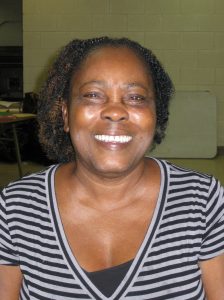
Interviewee: Anestasie Blyden
Interviewer: Jeffrey Boyce
Date: June 27, 2016
Location: St. Thomas, U.S. Virgin Islands
Description: Anestasie Blyden has served as a food service worker in the Virgin Islands for over fourteen years.
Jeffrey Boyce: I’m Jeffrey Boyce and it’s June 27, 2016, and I’m here today with Anestasie Blyden. I’m on St. Thomas in the Virgin Islands, and we’re here to talk about child nutrition. Welcome and thanks for taking the time.
Anestasie Blyden: OK.
JB: Could we begin today by you telling me a little bit about yourself, where you were born and where you grew up?
AB: I was born in St. Lucia and I come here and married, and then I stay on St. Thomas.
JB: Did you go to school on St. Lucia?
AB: Yes, in St. Lucia I made my school.
JB: And were there lunch programs there?
AB: They had lunch program, but what they was using was like milk, and orange, and so forth like that, not like St. Thomas, but I don’t know if it change now, but they were always serving the milk in the school.
JB: So you said you came to St. Thomas and got married.
AB: Yeah, I was married.
JB: And how did you get involved working in child nutrition?
AB: Oh, I want a job with government, so I apply, and then they didn’t reply me back, but I went to labor department and the labor department send me in the program, and then I’m in the program for now.
JB: And how long ago was that?
AB: I will be fourteen years.
JB: What positions have you held in those fourteen years?
AB: Food service worker.
JB: OK. What’s a typical day like for you? What time do you start and what do you do?
AB: In the morning we come at six o’clock and we leave in two o’clock. When I come sometimes I’m on dishes, sometimes I’m serving the children, a week each. Like this week I’m on plates.
JB: Oh, so you rotate?
AB: Yea. Two weeks we’re on plates, and two weeks we’re in front, and then cooking.
JB: Are there any challenges? What’s the biggest challenges you face in doing your job?
AB: Sometimes being rough, but sometimes it’s fine. Sometimes a lot of work, a lot of work on dishes. But for the children, it’s alright, but when on dishes – and sometimes we have to mop everywhere and clean everywhere tidy.
JB: What’s your favorite part of your job? What do you like to do best?
AB: What I want to do best is wash dishes, because sometimes when I mop I’m feeling my stomach, you know, so I prefer the dishes but I have to do it, I have to mop.
JB: What changes have you seen in the program over those fourteen years?
AB: Sometimes we not see no changing. The changing is the changing of food for the children. And sometimes they chew anything good, and sometimes they just drop it, and sometimes they’re eating it good.
JB: Do you have any memorable stories about special children you’ve served or people you’ve worked with over the years?
AB: Oh, we’ve got children. They alright. They never bring devilness for until now. They never tell me nothing. They say, “Good morning.” “Good afternoon my lady.” I say, “Good afternoon my son. How are you today?” They tell me, “I’m good.” They’re always greeting me and I’m always greeting them too.
JB: What advice would you give someone who was thinking about trying to get a job in child nutrition?
AB: I would tell them it’s a good thing, because it’s [unintelligible] taking care, to know more to do to develop their sense to know more about children, are they behaving good or well, you know, and the program is good.
JB: Anything else you’d like to add today?
AB: I like the program very much, but sometimes it’s been rough – because sometimes – eventually I want to retire, because I have the sugar, and I have the pressure, and sometimes it’s been rough for me to mop and mop and mop, but I’m doing all my work good, and it’s fourteen years I’ll be there. But I like it, I like the program.
JB: Well thanks for taking the time to talk with me. Good luck.
AB: OK. Thank you.